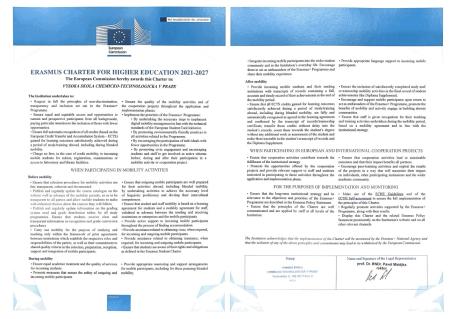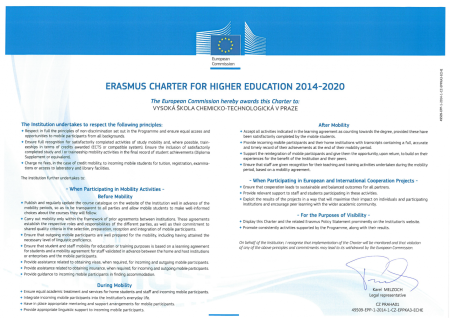Erasmus Charter for Higher Education (ECHE)
Erasmus Policy Statement (Overall Strategy) 2021 – 2027
The University of Chemistry and Technology, Prague (UCT Prague) is a renowned institution with the reputation of being a centre of premier education and research in the fields of technical chemistry, chemical and biochemical technologies, material and chemical engineering, food chemistry, and environmental studies, not only in the Czech Republic but in the whole Central European region.
The mission of UCT Prague is to educate its students to become either top-performing professionals for industry, government or excellent scientists contributing to strengthening the European Union's global competitiveness by developing a knowledge-based, innovative, and environmentally sustainable economy. The integral part of the mission is the active promotion of Science, Technology, Engineering, and Mathematics (STEM) to the public and especially aimed to spark the interest of the young generation in STEM. The same importance is assigned to the promotion of the values of democracy, openness, tolerance, education, and culture in our society. To accomplish its mission, the UCT Prague institutional strategy calls for all activities of the UCT Prague to be aimed at profiling the institution as the leading research-oriented university focused on a high-quality basic and applied research with an outstanding international reputation and commits UCT Prague to advance values of equal opportunities and to support the diversity of its students and staff.
The priority objectives (based on the UCT Prague Institutional Strategy) are:
1) Modernisation of the UCT Prague education system to increase quality and efficiency of study
Providing high-quality education is the cornerstone of any educational provider. The education offer should cater to the needs of industry and economy as well as to societal demand. Innovative curriculum development will have to be employed. New teaching delivery methods should be devised, including virtual and blended. Continue in the activity of the development of e-learning and other innovative electronic tools for accredited study programmes to streamline teaching and to achieve better learning outcomes. Use in teaching modern methods of project teaching and sharing of pedagogical capacities and infrastructure with other top workplaces at universities and in the industrial area.
2) Cultural learning of participants and creation of European Education Area
Raising participants' awareness and understanding of other cultures and countries, offering them the opportunity to build networks of international contacts, to actively participate in society and develop a sense of European citizenship and identity. Support activities that will lead towards the creation of European Education Area.
3) Development of key competences of students and strengthening their employability
The employability of graduates is one of the most important metrics for students to compare when choosing a higher-education institution to study. The employability of graduates is increased when they possess key competences, so-called "soft-skills", command a good level of a widely spoken foreign language (ideally two), and had practical experience from industry or business – which every student should acquire during his/her studies at UCT Prague. One of the best ways how to obtain all three is take part in mobility.
4) Effective internationalization of UCT Prague
Internationalization – the long-term objective of UCT Prague is active involvement in the international integration of higher-education and growth of cooperation on the international level in research and education with both European and non-European institutions. International cooperation in research and education is an essential condition for their further development the institution. Student and staff mobility, both outgoing and incoming, creation and implementation of joint study programs, internationalization of all areas of university life will help create an inspiring and stimulating environment at UCT Prague, where new ideas are born.
Subobjective 1 – Promotion of two-way mobility of students and staff
Continuation of promoting two-way mobility of students and staff, including in new formats, such as blended mobility, to help students and staff gain international experience and contacts for the future involvement of students and staff in international projects, creation and modification of study programmes or teaching in a foreign language.
Subobjective 2 – Support of development of Internationalisation at home
Inclusion the international and intercultural dimension into the study programs. Support activities that will help students and staff develop intercultural skills and support international understanding and will effectively support the international character of the university in a globalized world.
Conclusion
The vision is to utilize Erasmus+ Programme to help UCT Prague to accomplish its objectives and to strengthen UCT Prague position on the international level by enabling it to engage in cooperation with institutions within European Education Area as well as outside of it, what would not be otherwise possible at such extent. UCT Prague views the Erasmus+ Programme as an effective tool how to elevate its institutional quality and achieve institutional policy objectives that would otherwise take considerably longer time-period or were even impossible for institution of UCT Prague size and capacity. The participation in the Erasmus+ Programme is therefore an integral part of the internationalisation and modernisation strategy of UCT Prague.

Erasmus Charter for Higher Education (ECHE) – UCT Prague 2021 – 2027>
Erasmus Charter for Higher Education 2014 – 2020
Erasmus Policy Statement (Overall Strategy)
UCT Prague regards international cooperation as a vital part of its teaching and scientific activities and purposely extends and deepens this cooperation. Due to the active participation of academic staff in international scientific and educational projects and programmes (such as the EU FPs, TEMPUS, COST, COPERNICUS, EEA grants, NATO…), networking and contact making are continually expanding both in the terms of content as well as geographically. The main criterion for a new cooperation partner is the quality—related either to educational activities or to scientific quality and reputation; the assumption of mutual academic collaboration and reciprocity in student and staff mobility is very important. The areas of cooperation are linked more or less to technical chemistry, food chemistry and technology, material sciences, process engineering, chemical technologies and informatics, biotechnology etc. International scientific and educational events ongoing abroad or held at UCT Prague are also used for meeting new potential partners. Information about UCT Prague are disseminated through printed leaflets, brochures and presentations during staff international mobility.
At present, the University of Chemical and Technology Prague maintains nearly 150 Erasmus bilateral agreements with universities across Europe and more than 50 other agreements with partners not only in Europe but also in the USA, Canada, Australia, Japan, India and many other countries. UCT Prague is open to quality cooperation with all geographical areas. Cooperation with the European partners is of course the most frequent due to the easiest accessibility and lower financial cost.
The main objective of the internationalization is to keep UCT Prague at the top position with respect to both educational and scientific quality. Therefore, attention is consistently paid to the international mobility of staff and expanding opportunities to study abroad for UCTP students. The university seeks after all available resources to support long-term (one-two semesteral) study stays for students at all levels and this form of students' international experience will continue to develop. UCT Prague has fully implemented ECTS and Diploma Supplement Label, facilitating the recognition of studies abroad. For students mostly at doctoral level, internships and placements at leading scientific institutions are provided. Short-term stays at summer schools, conferences and workshops are consistently supported for students of MSc And PhD degrees. In addition to the LLP/Erasmus mobility, students participate in other international programmes, such as AAD, CEEPUS, AKTION, ATHENS, etc. The participation of scientific and pedagogical staff in international projects is highly recommended and supported; the presentation of results and making of new contacts are expected. The attempt to increase the number of teaching staff mobility will be permanently supported.
Great care is given to foreign students and visiting teaching staff. UCT Prague provides international students accredited Bachelor's and Master's study programmes taught in English and—for Erasmus students—a number of courses taught in English. The organization of Czech language courses for foreign students is considered an important activity in the internationalization and students' integration at the university.
Based on a long term cooperation with selected partner universities, double degree study programmes at Master and Doctoral levels in particular were established. Implementation of two Masters and two doctoral ERASMUS MUNDUS programmes resulted from multilateral interuniversity cooperation. Our further aim is to involve more Czech students in courses taught in English.
A very welcome and supported form of internationalization at UCT Prague is receiving doctoral students and trainees from third countries. Other successful activities we will continue to develop are short-term intensive training courses for students and teachers from third countries.
UCT Prague actively participates in a number of international projects and seeks for further participation in projects targeted towards teaching and training. The most successful implemented project is ERASMUS MUNDUS. Two Masters’ study programmes (EM3E and IMETE) have been running for two years; students studying under a consortium of European universities spend one semester at UCTP, some of them prepare also their diploma project and thesis here. UCTP has adopted all necessary procedures for issuing the joint diploma. Similarly, a doctoral programme EUDIME was implemented. During their stay at UCTP, PhD Students are actively involved in scientific research teams. The fourth EM project is EURINDIA where UCTP trains one PhD Student from India.
UCT Prague participates regularly in TEMPUS projects; in the past, through individual advisors/evaluators of several projects, currently as a partner. In this project, UCT Prague organizes intensive professional courses for teachers and students from Russian universities involved in the project.
Another form of cooperation is the participation of UCT Prague in ERASMUS thematic projects. The first one is the ISEKI-Food (originally FoodNet), which maps the teaching of food science and technology in Europe and to which UCTP has contributed a number of documents and data. The second example is the participation in the European Chemistry Thematic Network (ECTN and EC2EN2) which resulted in the possibility to grant IVTP graduates title EuroBachelor®.
Participation of UCT Prague in these projects is reflected in curricula modernization, creation of new degree programmes, awarding of double/joint diploma and implementation of new reaching methods and organization of studies. An integral part of the internationalization is an active students' club ESC and its involvement in the European network ECN; ESC plays an important role in the integration of foreign students into the local environment.

Erasmus Charter for Higher Education (ECHE) UCT Prague 2014 – 2020 >







